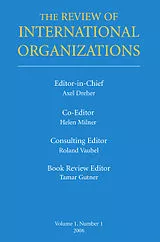Abstract
We present novel evidence suggesting that cronyism had a negative effect on economic growth in Egypt, during a period when international organizations praised the country for its reforms of business regulation. We identify 385 politically connected firms under the Mubarak regime. This large database allows us to show that 4-digit sectors that experienced crony entry between 1996 and 2006 exhibited lower aggregate employment growth subsequently than those that did not. In manufacturing, labor productivity grew more slowly in sectors that experienced crony entry.

Ample, though not definitive evidence suggests that this effect was causal. Crony entry skewed the distribution of employment toward smaller, less productive firms; crony firms do not appear to have entered sectors that would have also grown more slowly even in the absence of crony entry; and they enjoyed multiple regulatory and fiscal privileges that reduced competition and investments by non-crony firms, including trade protection and energy subsidies. These privileges account for the higher profits of politically connected firms.
Diwan, Ishac, Philip Keefer and Marc Schiffbauer. “Pyramid capitalism: Cronyism, regulation, and firm productivity in Egypt.” November 14, 2018
The full text of this publication is available in the link below.








